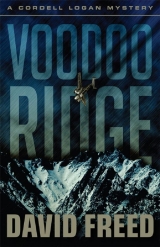
Текст книги "Voodoo Ridge"
Автор книги: David Freed
Жанр:
Триллеры
сообщить о нарушении
Текущая страница: 15 (всего у книги 17 страниц)
TWENTY-TWO
There’s a reason why professionals use short-barrel assault weapons when breaching buildings. A short barrel allows for greater mobility in close quarters; the shooter is less likely to get his weapon hung up in a doorway or have some enterprising bad guy snatch it out of his hands as he comes around a corner.
The man who came in shooting at me obviously hadn’t gotten the memo.
Armed with an old lever-action Winchester, the kind of rifle you see in every John Ford Western ever made, he came storming in, firing wildly from the hip.
Cock. Blam.
The first round ricocheted with a spark off the rock fireplace and took out an old brass floor lamp, missing me by mere inches.
Cock. Blam.
The second round was considerably farther off-target, knocking a barn owl, stuffed and mounted, off the wall.
Cock—
I reached from behind the door before he could get off a third shot, clamped my hand around the wooden forestock, and relieved him of the Winchester.
“Old” didn’t begin to describe him. “Ancient” did. He was bald but for the thatch of gray hairs protruding wildly from each of his Dumbo-sized ears. Baggy eyes. Yellowed teeth, missing in places. An insulated, one-piece army surplus snowsuit hung on his narrow frame like a kid wearing daddy’s pajamas.
“Give me back my gun.”
“So you can shoot me? I don’t think so.”
“It’s my gun and you’re in my house.” He was looking at me funny, up and down. “What are you, some kind of sexual deviant?”
Then I remembered: I was in the buff.
“Fell in a stream, up the trail,” I said. “Had to warm up before I froze.”
“So you break into my cabin?”
“My apologies. I’ll pay for the window.”
“You’re darned right you will.”
I ejected all of the Winchester’s remaining cartridges, the shells clattering on the wood floor, leaned the rifle next to the fireplace, then proceeded to put my clothes back on.
“What’re you doing?” the old man.
“What does it look like I’m doing?”
“It looks like you’re putting wet clothes back on.” He watched me ring out my socks. Water sizzled and hissed on the hearthstone. “Wait.”
He walked over, reached into a box beside the bed, and tossed me a dry, red flannel shirt, followed by blue jeans, and a rolled pair of socks, olive drab.
“I’d loan you some of my skivvies until yours dry out some,” he said, “but I’m not a weirdo.”
I thanked him for his kindness and put on his clothes while he propped a book against the pane of glass I’d broken, to keep out the cold.
“My name is Melvin Essex, by the way,” he said, “and I’m as old as the hills.”
“Cordell Logan. And I’m getting there.”
“That your truck down the road?”
“It is.”
“What’re you doing all the way up here in the middle of winter with no tire chains, no nothin’?”
I told him. Essex listened intently.
“You’ve had a rough go of it,” he said when I was done.
“I’ll live.”
“You hungry?”
“Now that you mention it…”
He had possum stew written all over him. Or fried squirrel. Something befitting a mountain man living the hermit’s life. But that wasn’t on the menu.
“Got some fresh croissants and a nice Brie. Just picked ’em up in town.”
“Works for me.”
He went outside to his truck and returned with a grocery bag, laying the food on the table, along with a quart of fresh-squeezed orange juice and two mismatched drinking glasses. We sat down and ate.
He told me he’d taught mechanical engineering at the University of Michigan, and had been indicted at the height of the conflict in Vietnam for allegedly helping orchestrate an antiwar protest in which several police officers were injured. Investigators, he said, manufactured the case against him out of whole cloth. He was denied tenure. Within a year, he’d lost his job. He never found work again in academia and ended up on a General Motors assembly line in Flint, Michigan.
“I vowed after that I’d never talk to another liar with a badge as long as I lived, and I haven’t,” Essex said. “More juice?”
“No thanks.”
“It’s like when the sheriff’s department came around a couple weeks ago,” he said. “They wanted to know if I knew anything about that boy you said got killed up the trail. Sure, I could’ve told them what I saw. But I wasn’t about to.”
“What did you see, Professor?”
He slathered Brie on his second croissant and looked at me over his glasses.
“How do I know you’re not some undercover cop?”
“If I were, I probably would’ve shot you the second you came in here, blazing away with that saddle rifle of yours.”
“Could be you didn’t shoot me because you dropped your gun when you fell in that stream.”
“Could be I didn’t have a gun to begin with.”
“You’ve got cop eyes.”
I got up, walked over to my wet jeans, pulled out my FAA-issued pilot’s certificate from my wet wallet, and showed it to him.
“I’m a flight instructor.”
He studied the plastic, credit card-size certificate, chewing slowly, then nodded like I’d convinced him and handed it back to me.
“About ten o’clock the night before that boy died, I heard a car go by. Nobody comes up here that late. The engine sounded kind of strange. A dull, rotational knock, like he had a loose main bearing. I didn’t bother getting out of bed. Then in the middle of the night, I hear the same engine. Now he’s coming back down the road, and he’s coming fast. This time, I get up. There’s a good moon, and I see him out the window: a van. Green.”
I stared into the fire, my memory flashing on the high school kid who’d been shoveling snow outside his family’s house the morning Savannah disappeared from the B&B. I remembered his name – Billy. He’d called later to say he’d seen a woman who looked like Savannah trying to escape from a man parked outside a Mexican restaurant in South Lake Tahoe.
The man, Billy said, was driving a green van.
We chatted for another few minutes, mostly about airplanes and aeronautical engineering, with which the professor seemed endlessly fascinated, until my clothes and shoes were no longer wet but merely damp. They’d have to do. I changed out of Essex’s shirt, jeans, and socks, and into my own. My wallet held one twenty dollar bill. I tried to give it to him, to cover the cost of the window I’d broken, but he refused to take it.
“I’m happy my cabin was here for you. And, besides, I don’t get many visitors these days. I enjoyed the company.”
We shook hands.
“Peace, love, and rock and roll,” he said, flashing me a V-shaped peace sign as I started down the road, toward my truck.
“Groovy.”
Was the green van that Essex had observed after Chad Lovejoy was shot to death the same green van that Billy, the snow-shoveling, snowboarding teenager, said he’d seen outside the Mexican restaurant? The same green van from which a woman who Billy said resembled Savannah tried to escape?
I didn’t know, but I most definitely intended to find out.
* * *
Streeter seemed mildly interested when I called him about the possible van connection.
“Did anybody get a license number?”
“No.”
“We’ll check it out,” he said.
“When?”
“When time allows. We’re working a couple of new angles right now that look extremely promising.”
The FBI’s lab in Quantico, Virginia, he said, now was actively involved in the investigation. I assumed that the feds were assessing such evidence as tire tracks and boot prints, but I didn’t ask. Streeter would’ve been reluctant to provide any details, given the ongoing nature of his investigation, and for once, I didn’t feel like pressing the issue. I was tired. Beyond tired.
I found a low rise overlooking the south end of Lake Tahoe and sat in my truck, the heater on low. The sky was clear. Whitecaps rippled the water, while the pines swayed fluidly on a stiff south wind. The trees reminded me of Savannah, the way she used to dance to samba music on the radio, her hips keeping perfect, seductive time to the beat, her arms snaking gracefully, always coaxing me with her hands and her smile to join her. I tried to block the memory from my head. I tried not to think of her. Only masochists seek that kind of pain.
I needed to focus and find that green van.
The kid who’d first told me about it, Billy, had said he’d get back to me if anything else about what he’d seen that night outside the Mexican restaurant bubbled up from the recesses of his adolescent brain. I never heard from him after that. Maybe it was time he heard from me.
* * *
Billy wasn’t home. His mother was. She stood inside the front doorway with her arms crossed, staring at me like I was trying to sell her a subscription to Pedophile magazine.
“Why do you want to talk to him?”
“It concerns a criminal matter.”
“What? What kind of criminal matter?” She was in her early fifties, short and busty, with glittery nail polish, and frosted, severely jagged blonde and black hair that appeared to have been cut by a stylist in a foul mood.
“He may have witnessed an abduction,” I said.
“An abduction. Yeah, right. Look, whatever you think my son knows, or ‘witnessed,’ he didn’t, OK? He has a very active imagination. Besides, if he saw something, he would’ve told me, or his father.”
“Billy may have information that could help identify the person who did it. Look, I’m not a cop.”
“Then who are you?”
“The victim was someone very close to me.”
“My son knows nothing.”
“If I could just talk to him for a—”
“—I told you, he’s not here, OK? We don’t want any trouble. Please don’t make me call the police.”
She shut the door in my face.
In most foreign places, you can’t simply hang out in a vehicle and wait for your target to show up. I tried that once with two other go-to guys in a Citroen along the Rue Charles de Gaulle in downtown Tunis. We were tracking a bagman working for a radical Salafist group, waiting for him to make a money drop outside the Monoprix supermarket. Several local men mistook us in our berkas for female Tunisians and began making what could best be diplomatically described as “amorous advances.” We broke off the surveillance and drove on, but not before one of my colleagues reached through the window and crushed the windpipe of one would-be suitor who’d gotten a little too fresh.
Waiting for a high school kid in South Lake Tahoe would be cake by comparison.
I parked a block up the street, affording a view of both avenues of approach, and settled in. Dozens of cars and trucks passed by, along with two dog walkers and several joggers. Nobody even so much as looked in my direction.
After about ten minutes, a primer-gray VW bug came put-putting down the street and passed by.
Billy was driving.
I fired up the ignition, made a hard right turn, and followed the VW into his parents’ driveway. Billy parked behind a fire engine red Dodge Ram pickup with chrome wheels and got out of the Volkswagen, lugging his trumpet case.
He didn’t see me initially as I pulled in, jumped out, and approached him.
“Yo, Billy, you got a sec?”
He turned toward me, brushing the hair out of his eyes. The expression on his face was a blend of surprise and fear.
“You remember me?”
“Yeah.”
“When we talked on the phone, you said you’d let me know if you thought of anything else you saw that night. Remember that?”
“Yeah. Pretty much.” He licked his lips. “All I saw is pretty much everything I told you.”
“ ‘Pretty much’ suggests to me there might be more.”
His eyes darted side to side. “Uh, no. Not really. That was pretty much about it. Can’t remember anything else. Anyway, I better get inside.”
I blocked his path.
“There’s something you’re not telling me, Billy.”
“I don’t know what you’re talking about.”
Clearly, he did.
I stood aside anyway and let him pass. As I did, the front door opened and a short, bald man with gray sweat pants, a black “Harley of Reno” T-shirt, and a Fu Manchu moustache came charging out, spitting angry, with a claw hammer in his hand.
“Get off my property.”
“It’s OK, Dad,” Billy said, grabbing him and holding on, trying to stop him from coming any closer to me. “He’s not the guy.”
In the wake of Savannah’s disappearance, I’d been attacked by a man with a gun, another with a knife, and now one with a hammer. What in the hell, I wondered, was going on?
“There’s no need for violence,” I said, which would’ve sounded mildly humorous had Billy’s father known my personal work history.
“I said get off my property!”
Billy looped his arms around his waist and dug his heels in like a rodeo cowboy wrestling a steer, struggling to hold on.
“Dad, stop! It’s not the guy!”
“It’s not?”
“No. I told you. This is the guy who showed me the picture.”
“Oh.” Billy’s father drew a deep breath. “Sorry,” he said to me. “I thought you were somebody else.”
“Which guy?” I said to Billy.
“Billy, no,” his father pleaded. “Don’t. Please.”
The kid looked over at him like he was trying to make up his mind, then, finally, at me.
“The guy who took your girlfriend,” Billy said. “I saw him again.”
TWENTY-THREE
Billy’s father, Gary, was an unlicensed contractor who’d recently been indicted for allegedly defrauding several residents of the Lake Tahoe area by billing them for home repairs that never were performed. Which explained, Gary said, why he’d sought to prevent Billy from contacting authorities about what he knew of the man in the green van.
“I didn’t want it jumbling things up and messing up my trial,” Gary said. “You know how juries are.”
I said I understood, even if I didn’t, and asked Billy to tell me what he knew. It went something like this:
Several days after Billy called to tell me he’d seen a man forcing a woman back into a green van outside the Los Mexicanos restaurant, he’d spotted what he was convinced was the same van outside an auto parts store in the town of Truckee, where he’d gone to price out a new muffler for his VW. He was standing behind the van, tapping the license plate number into his phone, when the van’s owner appeared and demanded to know what the hell he was doing. Intimidated, Billy couldn’t think of anything to say other than, “Nothing.” The guy snatched Billy’s phone away, demanded that the kid divulge his own name and address, which Billy did, then threatened to come pay him a visit if anyone, particularly the cops, contacted him for “any reason.”
Frightened, Billy promptly raced home and told his parents what had happened in Truckee. He also told them about me, how I’d first approached him the day Savannah went missing, and about what he’d seen that day after school outside Los Mexicanos.
“I swear I was gonna call you back,” he told me, “but…”
“His mother and me, we told him not to,” Gary said. “We don’t want any trouble from that man.”
“That man,” I said, “may be responsible for two murders.”
“Well, we don’t want to be number three.”
“I still remember the dude’s license number,” Billy said.
“No, Billy,” his father said.
“But, Dad—”
“I said no, son! Now, go inside.”
“I need that number,” I said. “And I’m not going anywhere until he gives it to me.”
“Do you have any children of your own?” Gary asked me.
His question stung like a punch. I could’ve told him about how Savannah was pregnant when she died, but I didn’t.
“No.”
“Well, maybe if you did, you’d understand better. It’s not that I don’t want to help you. It’s just that we can’t. My son should’ve never talked to you to begin with. Now, please, go away. Leave us alone.”
“But why can’t I give it to him, Dad?”
“Get in the damn house, Billy.”
The kid rolled his eyes and reluctantly headed for the house.
“Before you go, Billy,” I said, more to his father than anyone else, “you might want to consider your options. You can give me that plate number, and I’ll give you my word that I won’t tell another soul where I got it. Or you can call the sheriff’s department and tell them yourself. If you don’t tell them, I’ll tell them we had this talk, and they’ll arrest you for withholding evidence. And, if you do tell them, they’ll put it in their official file, where they got the number. When they arrest that dude with the van, it’ll all come out in open court, how the cops came to find him. And when the dude gets out of prison early – and everybody in California gets out of prison early – I guarantee, he’ll come looking for you.”
His father stood there in silence, blinking at me, unsure what to do, then at his son.
“Please, Dad.”
His father hung his head and nodded, then went back inside. Billy seemed almost relieved to give me the plate number, proud of himself for remembering it. I asked him if he remembered seeing any signs or stickers on the van when he was in Truckee, anything that might provide me a better notion of who drove it.
He said he didn’t.
Could he offer any more specific details about the owner himself?
“He was pretty big,” Billy said after thinking about it for a few seconds.
“You mean heavy?”
“More like, you know, tall.”
“How tall?”
“About your height. Maybe an inch more. Or two. Something like that.”
“Anything else you can remember?”
Billy looked down at his red Chuck Taylors and thought hard.
“Not really,” he said after awhile.
“You did good, Billy.”
He smiled shyly. We shook hands.
The sun was setting. The air was chilled. I zipped up my jacket and watched Billy head inside, then called Buzz. It was pushing 2100 hours on the East Coast. The phone rang four times before his machine picked up, with a personal greeting from the man himself:
“I’m trying to avoid somebody I dislike,” Buzz’s voice said. “Leave a message. If I don’t call you back, you’ll know it’s you.”
Beep.
I left the license plate number Billy had given me and asked Buzz to run it.
* * *
My wallet held less than twenty dollars in cash. I was $105.43 short of maxing out the credit limit on my Visa card, according to the pleasant-sounding young Indian woman on the other end of the 1-800 customer service number printed on the back. She said her name was “Kimberly.”
“How may I assist you today, Mr. Logan?”
I kicked off my soggy hiking shoes and lay back on my bed at the Econo Lodge. I had enough credit for one more night’s lodging, and barely enough for gas to get home. Unless Mumbai saw fit to up my limit, I’d have no choice but to leave Lake Tahoe in the morning, surrendering any hope of finding Savannah’s killer on my own anytime soon, if ever.
“You can start off by telling me your real name,” I said. “Not the anglicized version you give out so that geocentric Americans won’t be quite so intimidated talking to a non-American. I like to know who I’m really talking to.”
A long pause.
“I am called Nirupama.”
“Pretty name.”
“Thank you. How can I be of service, Mr. Logan?”
“I need you to raise my credit limit, Nirupama.”
“I understand you would like your credit limit raised on this account. Is this correct?”
“Yes.”
Another long pause. She was no doubt on the computer, studying my sketchy payment record – or, perhaps more accurately, nonpayment record.
“I’m sure we can accommodate your request in some fashion. May I kindly place you on brief hold while I consult my supervisor?”
“Sure.”
Elevator music ensued. It soothed my brain. How long I was on hold or when Nirupama hung up on me, I couldn’t say, because I fell asleep. When I awoke, I was on my stomach and my phone was ringing on the carpeted floor. Daylight was sneaking in through the curtains. Morning already.
“This is Logan.”
“This plate number you left on my machine, is this the booger eater who did your lady?” Buzz asked, his voice faint and static-charged from 3,000 miles away.
“Possibly.”
“Well, if it is, save a piece of him for me, will ya?”
“Roger that.”
“You ready to copy?”
“Go.”
Willing my eyes to focus, I grabbed an Econo Lodge pen off the nightstand and a slip of paper from a wafer-thin, motel-provided notepad.
Buzz had tapped into California Department of Motor Vehicle files. Had he violated privacy laws in doing so? Most certainly. But it wasn’t like I was Al-Qaeda. A covert operator had shown his former covert operator friend a little love. Happens all the time.
The plate linked to a green 2003 Chevy Astro Cargo Van and was registered to a Nevada corporation – Patriot Flow Professionals, LLC. The company showed a corporate address in Reno, about an hour and a half away, depending on how snowy the roads were.
“And I already know what your next question is,” Buzz said.
“What is Patriot Flow Professionals?”
“Like I said, I’m one step ahead of you.”
Buzz had pulled up Nevada Secretary of State corporate records. Under “type of business,” Patriot Flow was described simply as a “wholesaler.” The company’s registered agent was identified as D. B. Anderson. He or she also was listed as the company’s president, secretary, and treasurer.
“You’re wondering who D. B. Anderson is,” Buzz said, “and that’s where I can’t help you.”
The name, Buzz said, was too common to research without extraneous effort. I never would have asked him to put in that kind of labor in my behalf, given the pressures of his seventy-hour workweek, saving the free world as a counterterrorism analyst.
“That’s one Pavarotti CD I owe you anyway,” I said.
“We’ll call this one even. Good hunting, Logan. You lemme know if you need any backup, you hear?”
“You’re a man among man, Buzz.”
“That’s what I keep telling my wife.”
I showered quickly, packed, slurped down a bowl of Cheerios in the dining area adjacent to the motel’s lobby, left my plastic room key on the front counter, and headed north to Reno.
* * *
The corporate headquarters of Patriot Flow Professionals was situated on the edge of a complex of prefabricated concrete warehouses hunkered north of Interstate 80 on the west side of the “Biggest Little City in the World,” as Reno likes to call itself. There wasn’t a green Chevy van in sight. I got out of my truck and walked to the office door of the warehouse that corresponded to the address Buzz had given me. On the door’s glass insert, I could see the faint outline of stenciled letters, scraped clean: atr ot low Pr f n ls.
I peered through the window. The office was empty. Random pipe fittings, brass and PVC, alongside an unrolled string of plumber’s Teflon tape, littered the floor.
In the glass, I saw the reflection of a uniformed security guard striding toward me.
“Can I help you, sir?”
He was clean cut and buttoned-down, mid-twenties, five foot ten, 160 give or take a few pounds, with a pimpled complexion, mirrored aviator shades, and an all-business attitude. Riding his waist was a black leather duty belt that held handcuffs, a walkie-talkie, and Mace spray, but no pistol.
“I’m looking for Patriot Flow Professionals.”
“May I ask why?”
“It involves a criminal investigation.”
“Are you a detective?”
“Do I look like a detective to you?”
“Yeah, you do, actually.”
“So, what can you tell me about Patriot Flow Professionals?”
“They took off, about two weeks ago.”
The guard told me that the company owed several months’ back rent. They’d stripped the office bare and skipped out in the middle of the night.
“Do you remember any of the employees, what they looked like?”
“Only one I can think of was this one guy. Sort of waved when he’d see me.”
“What did he look like?”
“Tall, white. I didn’t see him up close. I just started a month ago.”
“Any idea where they might’ve moved to?”
“Personally, I don’t. But somebody else might.” He unholstered his walkie-talkie, held it to his lips, and pressed the transmit button. “Unit One, base.”
“Base, go ahead,” a female voice said over the radio. She sounded young and bored.
“Yeah, Lisa, I’ve got a gentleman here, he wants to know if we’ve got a current ten-twenty on Patriot Flow Professionals.”
“He probably owes him money too,” Lisa said, chuckling.
“He may be wanted for questioning in a double murder in Lake Tahoe,” I said.
The guard peeled off his sunglasses. “Are you kidding?”
I shook my head no.
He held the walkie-talkie to his lips and pressed the transmit button again. “He says the dude is wanted for murder.”
“Really?” the dispatcher said.
“That’s what he says.”
“OK, stand by one.”
Cars and semitrucks rolled past on the interstate, a quarter mile away. Overhead, a hawk circled, trying to ignore the crows that were harassing him. We waited.
His walkie-talkie crackled to life.
“Dispatch, unit one.”
“This is unit one,” he said.
“Yeah, Ryan, the only thing anybody around here knows,” the dispatcher said over the radio, “is that Patriot Flow might’ve moved to the Tahoe area. Clarice in billing thinks the CEO was from somewhere around down there.”
“Copy that.”
He volunteered that he was waiting to get into the Reno police academy and asked me what department I was with.
“None.”
Ryan looked dismayed. “You told me you were a cop.”
“On the contrary, Ryan. You said I was a cop. Do me a favor. Ask if she’s got an address in Tahoe.”
“I would if you were a cop.”
“Look, I’m pretty certain this guy murdered my wife.”
Ryan searched my eyes and saw my pain. Slowly, he brought the walkie-talkie to his lips and keyed the transmit button.
“Lisa, any chance we got an address in Tahoe?”
“Stand by.”
“How’d he kill her, you don’t mind me asking?”
“Strangled her.”
“That bites.”
“You have no idea.”
“Dispatch, unit one.”
“Go ahead, Lisa.”
“Yeah, Ryan, Clarice doesn’t have a specific address or anything. But she says the skip tracer thinks it’s on Airport Road.”
Airport Road. Where Summit Aviation Services was located. Where ex-con Chad Lovejoy labored for his shady uncle, Gordon Priest, before being shot dead beside the ghost of an airplane in the snowy mountains of the Sierra Nevada.








